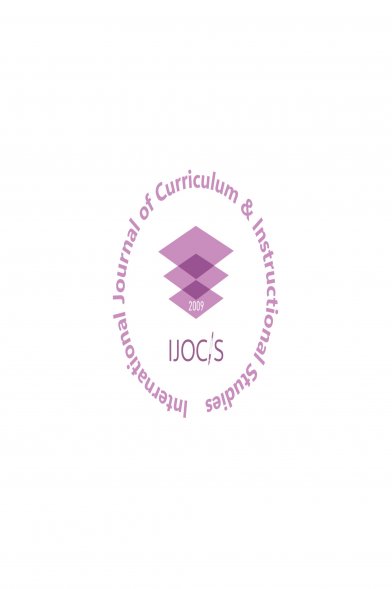Öğretmen adaylarının mesleki etik değerlerine yönelik bir ölçek geliştirme çalışması
Development and validation of a Professional Ethics Scale for pre-service teachers
___
- Aydoğan, İ. (2011). Öğretmenlerin mesleki etik ilkelere uyma düzeylerinin öğrenciler tarafından algılanması. Fırat Üniversitesi Sosyal Bilimler Dergisi, 21(2).
- Barrett, D. E., Headley, K. N., Stovall, B., & Witte, J. C. (2006). Teachers’ perceptions of the frequency and seriousness of violations of ethical standards. The Journal of Psychology, 140, 421-433. https://doi.org/10.3200/JRLP.140.5.421-433
- Barrett, D. E., Casey, J. E., Visser, R. D., & Headley, K. N. (2012). How do teachers make judgments about ethical and unethical behaviors? Toward the development of a code of conduct for teachers. Teaching and Teacher Education, 28(6), 890-898. https://doi.org/10.1016/j.tate.2012.04.003
- Büyüköztürk, S. (2004). Veri analizi el kitabı. Ankara: PegemA Yayıncılık.
- Campbell, E. (2000). Professional ethics in teaching: Towards the development of a code of practice. Cambridge Journal of Education, 30(2), 203-221. https://doi.org/10.1080/03057640050075198
- Ei, S., & Bowen, A. (2002). College student’s perceptions of student-instructor relationship. Ethics & Behavior, 12(2), 177-190. https://doi.org/10.1207/S15327019EB1202_5
- Forsyth, D. R, O’Boyle Jr, E. H, & McDaniel, M. A (2008). East meets west: A meta-analytic investigation of cultural variations in idealism and relativism. Journal of Business Ethics, 83, 813–833.
- Gözütok, F. D. (1999). Öğretmenlerin etik davranışları. Ankara Üniversitesi Eğitim Bilimleri Fakültesi Dergisi, 32(1-2), 83-99.
- Haynes, F. (1998) The ethical school. London: Routledge.
- HEC (2007). Öğretmen yetiştirme ve eğitim fakülteleri (1982- 2007). Ankara: Yükseköğretim Kurulu. Retrieved from: http://www.yok.gov.tr/documents/10279/49665/aciklama_programlar/aa7bd091-9328-4df7-aafa2b99edb6872f
- Hofstede, G. (1983). The cultural relativity of organizational practices and theories. Journal of International Business Studies, 75-89.
- Hu, L., & Bentler, P. M. (1999). Cutoff criteria for fit indices in covariance structure analysis: Conventional criteria versus new alternatives. Structural Equation Modeling, 6, 1–55. http:// dx.doi.org/10.1080/10705519909540118
- Kumar, S. D., & Kaur, S. (2014). Professional ethics grow with teaching experience: A study of women teachers in higher education institutions of Punjab. European Academic Research, 2(4), 5904-5922.
- Lovat, T. J. (1998) Ethics and ethics education: professional and curricular best practice. Curriculum Perspectives, 18(1), 1-7.
- Maxwell, B., & Schwimmer, M. (2016). Professional ethics education for future teachers: A narrative review of the scholarly writings. Journal of Moral Education, 45(3), 354-371. https://doi.org/10.1080/03057240.2016.1204271
- McKelvie-Sebileau, P. (2011). Patterns of development and use of codes of conduct for teachers in 24 countries. Série Ethique et corruption dans l’éducation. Paris: IIPE-UNESCO.
- Miller, E.W. (2000). Ethics in higher education. In Miller et. al (Ed.), Ethics in Academia, (pp. 1-2). Pennsylvania: The Pennsylvania Academy of Science.
- MoNE (Ministry of National Education). (2015). Öğretmenlik Mesleği Etik İlkeleri. Retrieved from: http://askale.meb.gov.tr/meb_iys_dosyalar/2015_07/08040929_etmclernmesleketklkeler.pdf
- Murphy, K. R. & Davidshafer, C. O. (2005). Psychological testing: Principles and applications (6th ed.). Upper Saddle River, NJ: Prentice Hall.
- Özbek, O. (2003). Beden eğitimi öğretmenlerinin mesleki etik ilkeleri ve bu ilkelere uyma düzeyleri. Unpublished Master's thesis, Ankara University.
- Öztürk-Aynal, S. O., Kumandaş, H., & Ersanlı, K. (2013). Okul öncesi öğretmenlerine yönelik mesleki etik ilkeleri ölçeği geliştirme çalışması. Ahi Evran Üniversitesi Kırşehir Eğitim Fakültesi Dergisi (KEFAD), 14(1), 429-442.
- Pelit, E. & Güçer, E. (2006). Öğretmen adaylarının öğretmenlik mesleğiyle ilgili etik olmayan davranışlara ve öğretmenleri etik dışı davranışa yönelten faktörlere ilişkin algılamaları. Ticaret ve Turizm Eğitim Fakültesi Dergisi, 2, 95-119.
- Poisson, M. (2009). Guidelines for the design and effective use of teacher codes of conduct. Ethics and Corruption in education Series. Paris: IIEP-UNESCO
- Sevim, O. (2014). Akademik Etik Değerler Ölçeğinin Geliştirilmesi: Güvenirlik ve Geçerlik Çalışması. International Periodical for The Languages, Literature and History of Turkish or Turkic, 9(6), 943-957.
- Singer, P. (1993). A companion to ethics. Oxford: Blackwell.
- Sorokin, P. (2017). Social and cultural dynamics (1st ed.). New York: Routledge.
- Tabachnick, B. G., Keith-Siegel, P., & Pope, K. S. (1991). Ethics of teaching: Beliefs and behaviors of psychologists as educators. American Psychologist, 46, 5, 506. http://dx.doi.org/10.1037/0003- 066X.46.5.506
- Tabachnick, B. G., & Fidell, L. S. (2007). Using multivariate statistics (5th ed.). Boston: Pearson Education, Inc./Allyn & Bacon.
- Turkish Language Association, 2016 (2016). http://www.tdk.gov.tr/index.php?option=com_bts&view=bts&kategori1=veritbn&kelimesec=118065
- Weil, V. (2005). Standards for evaluating proposals to develop ethics curricula. Science and Engineering Ethics, 11, 501-507. https://doi.org/10.1007/s11948-005-0020-5
- Yılmaz, E. (2005). Etik liderlik ölçeği’nin geçerlik ve güvenirlik çalışması. XlV. Eğitim Bilimleri Kongresi Bildiri Kitabı, 808-814.
- Yılmaz, K. & Altınkurt, Y. (2009). Öğretmen adaylarının mesleki etik dışı davranışlar ile ilgili görüşleri. İş Ahlakı Dergisi, 2(2) 71-78.
- ISSN: 2146-3638
- Yayın Aralığı: 2
- Başlangıç: 2011
- Yayıncı: Eğitim Programları ve Öğretim Derneği
A Study on preservice teachers’ academic self-efficacy
Yabancılara Türkçe öğretimi ders kitaplarındaki kalıpsözlerin karşılaştırmalı incelenmesi
Mustafa MAVAŞOĞLU, Nahide ARSLAN
Metinden öğrenme ilkelerine göre hazırlanan ders kitabının öğrenci erişisine etkisi
Öğretmen adaylarının mesleki etik değerlerine yönelik bir ölçek geliştirme çalışması
Sevinç GELMEZ BURAKGAZİ, İclal CAN
A comparative study of formulaic expressions in textbooks of Turkish as a foreign language
Nahide ARSLAN, MUSTAFA MAVAŞOĞLU
Problems and solutions in achieving learning outcomes of the 4th grade social studies curriculum
Çok kültürlü bir dünyada mültecilerin eğitim gereksinimleri: Soruna yenilikçi bir çözüm
Kamil Arif KIRKIÇ, Ayşe Perihan KIRKIÇ, Şeyma BERBEROĞLU
Öğretmen adaylarının akademik öz yeterliklerinin incelenmesi
